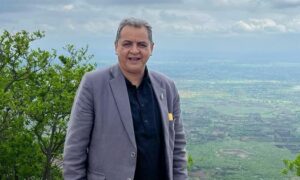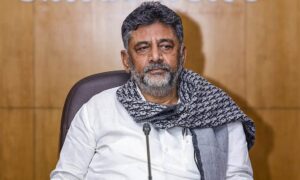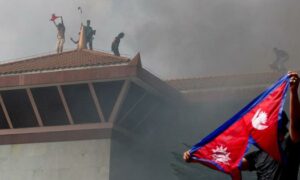Imposing fixed timelines on governors and the president to act on bills passed by state Assemblies would amount to one organ of the government assuming powers not vested in it by the Constitution, PTI quoted the Centre as telling the Supreme Court.
Such a move could lead to “constitutional disorder”, it added.
The Centre’s submission was in response to a notice issued by the Supreme Court on July 22 to the Centre and all state governments on a reference made by President Droupadi Murmu about the court’s April 8 ruling that set deadlines for governors and the president to grant assent to bills.
A constitution bench comprising Chief Justice BR Gavai and Justices Surya Kant, Vikram Nath, PS Narasimha and AS Chandurkar is hearing the matter.
In a written reply on August 12, Solicitor General Tushar Mehta stated that the judiciary does not hold answers to all problems in a democracy.
“The alleged failure, inaction or error of one organ does not and cannot authorise another organ to assume powers that the Constitution has not vested in it,” PTI quoted Mehta as stating.
He added: “If any organ is permitted to arrogate to itself the functions of another…the consequence would be a constitutional disorder not envisaged by the framers [of the Constitution].”
The April 8 ruling came on a petition filed by the Tamil Nadu government after Governor RN Ravi did not act on several bills for more than three years before rejecting them and sending some to the president.
The court held that governors must decide on bills within a reasonable time and cannot delay indefinitely under Article 200. Similarly, the president must act within three months under Article 201, and any delay beyond that must be explained and communicated to the state government. Both provisions outline the process of assent to bills by governors and the president.
The judgment had also introduced the concept of “deemed assent” in cases of prolonged inaction, allowing pending bills to be considered approved.
In May, Murmu made the reference to the court under Article 143(1) of the Constitution with regard to its April 8 ruling.
Article 143(1) allows the president to ask for the opinion and the advice of the court on matters of legal and public importance.
In his note, Mehta argued that the positions of governor and president are “politically plenary” and represent “high ideals of democratic governance”.
Any perceived lapses must be addressed through political and constitutional mechanisms, and not necessarily through judicial interventions, he added.
Challenging the April 8 ruling, Mehta said that Articles 200 and 201 deliberately contain no timelines.
“When the Constitution seeks to impose time limits for taking certain decisions, it specifically mentions such time limits,” PTI quoted Mehta as stating. “Where it has consciously kept the exercise of powers flexible, it does not impose any fixed time limit.”
“To judicially read in such a limitation would be to amend the Constitution,” Mehta added.
The hearing on the presidential reference is scheduled to begin on Tuesday.
This article first appeared on Scroll.in
📰 Crime Today News is proudly sponsored by DRYFRUIT & CO – A Brand by eFabby Global LLC
Design & Developed by Yes Mom Hosting






